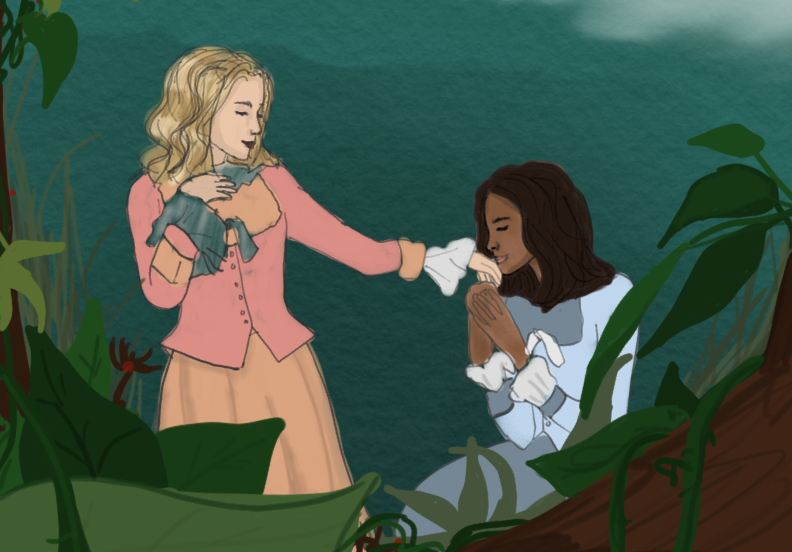The United States midterm elections marked a historical moment for LGBTQ people, with record numbers of LGBTQ candidates taking office. As the government begins to reflect the diversity within the country, the Performing Arts Department will similarly mirror the increasing representation of LGBTQ people in the winter play, “A Midsummer Night’s Dream.”
During the Elizabethan Era, Shakespeare’s plays dominated the stages with a solely male cast. However, Harvard-Westlake’s production of “A Midsummer Night’s Dream” will feature a lesbian relationship and open up many roles to more than one gender. Performing arts teacher Rees Pugh said he had the idea to change the genders to make the play more modern.
“I’ve wanted to do ‘A Midsummer Night’s Dream’ for a long time,” Pugh said. “I chose it and then looked carefully at it about switching the genders of as many roles as possible. Then, I looked more carefully at the central conflict and the dilemma of the father and the daughter and the insistence that she marries this man. I was just really looking at how many men’s roles could I switch around to women, if any.”
Shakespeare’s original “A Midsummer Night’s Dream” is set in Athens and follows a girl, Hermia, and the love triangle between her suitor Demetrius and the man she truly loves, Lysander. The plot also features the story of Oberon, the king of fairies, who decides to cause problems for Demetrius and the girl who’s in love with him, Helena. A mix-up leads to Lysander falling in love with Helena and leaves all the characters to sort through the problems that Oberon created.
Pugh’s adaption of the play takes a more modern approach with the casting by portraying Lysander as a woman named Lysandra. Pugh said that he has never heard of a Shakspeare play that explores gender in this way and is excited to conduct this new version. Because Shakespeare’s play has very few women, Pugh said that he was looking at what roles he could change to make the play more current.
Pugh said he avoided drastic changes to the script, only adding minor adjustments to accommodate the change in genders.
“What makes Shakespeare meaningful for me is not necessarily the plot or the story at all but the language itself,” Pugh said. “The poetry is exquisite, and to do away with that, to do an adaptation and put it in modern speech, for example, does a disservice to the whole thing. The whole reason to do it for me is to explore the poetry and the beauty of the language.”
English teacher Jocelyn Medawar, who teaches a class focusing on Shakespeare, said she believes that it is great that Pugh is modernizing Shakespeare.
“I think adapting Shakespeare to the needs of the society putting him on is a perfect thing to do,” Medawar said. “I think it’s vital that we see Shakespeare as utterly dynamic because his plays and his plots transcend their time period. I think that crossing gender lines and exploring all of the issues that are most relevant to us are incredibly relevant to him I don’t think we’re gaining anything by not bringing him into the modern world.”
This adaptation of the play also challenges gender-specific characteristics Pugh said.
“The [original] play examines gender differences in typically ancient ways where men are a certain way and women behave a certain way,” Pugh said. “The idea that men are aggressive and women are frail is central to some of the themes. There are aggressive women, and there are passive and frail men and there is everything on the spectrum in between.”
Jake Schroeder ’20 said he is excited that the play is more contemporary.
“I think that it progresses our school and the direction it should be going towards, and I think that it’s awesome,” Schroeder said. “I think people often forget about stereotypes and gender roles in musicals, and I think that it’s like a really important thing to advance further.”
As the school has increased representation for the LGBTQ community, the midterm elections also saw more diversity in this area. According to NPR, over 400 candidates that are LGBTQ were seen on the ballot and candidates such as Jared Polis found great success. Polis won the election for Governor of Colorado and is the first openly gay man to be elected governor in United States history.
Tali Tufeld ’20, who worked on the campaign for bisexual congresswoman-elect Katie Hill said that she thinks that the play has a greater meaning that does not just apply to the Harvard-Westlake community but to the rest of the country.
“In this day and age, you watch TV and there aren’t that many gay people, if any, or any people part of the LGBTQ community,” Tufeld said. “I think that having these two women as love interests on our campus is a great way that we’re able to contribute to that community and showing representation, especially with the Trump administration wanting to erase transgender people or non-binary people. [The play] is another thing to combat that and to show that LGBTQ people do exist and they are valid and they are here.”





































